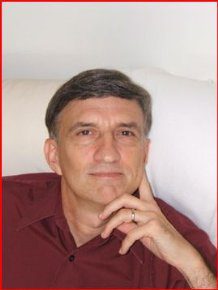When Pastor Mike Slaughter invited friend Chuck Gutenson to interview for a position on the pastoral team at the mega-church Ginghamsburg United Methodist Church in Tipp City, OH, he was completely unprepared for the concerns expressed by his church’s Leadership Board over Gutenson’s politics. (Gutenson was the COO at Sojourner’s Magazine and a politically left-leaning Evangelical.) The word that immediately came to Slaughter’s mind during the energetic discussions surrounding Chuck’s interview was “hijacked.”
The Board’s reaction, in his opinion, was another symptom of the church being hijacked by partisan politics. At the extreme, a hijacked church can forget and has forgotten its true identity as a Christian community called to follow the way of Jesus, rather than a particular political party. Galvanized by this real-life encounter with how politics can infiltrate the Church, Slaughter teamed up with Gutenson to write Hijacked: Responding to the Partisan Church Divide. (For more on Hijacked, visit the Patheos Book Club here.)

We invited Mike (pictured, right) and Chuck (pictured, left) to respond to some questions about their book, and share their hopes for the conversations and healing it might inspire in the Church.
Let’s say Rick Santorum, Mitt Romney, and President Obama formed a book club to read this book. What would you want them to learn?
Mike: My word to these three men would be not to demonize each other. It’s critical that our political candidates and officeholders learn to really discuss and debate the value of ideas without equating disagreement on issues with each other to character flaws in each other. Also, making judgments about a political opponent’s faith walk or practices needs to stop.
Chuck: Since they all three self-identify as Christians, I would want them to walk away from the book reminded that what unifies them as followers of Jesus takes priority over the differences they have as partisan politicians. Sadly, politicians continue to demonize each other and suggest that those who disagree with them are “not really” Christians, and they continue to do it because it works. There is a higher moral calling, though for us as Christians, than simply what works for partisan gain. I would like to see these three politicians walk away from their book club not only committed to open and transparent debate about their policy positions and differences, but at the same time, refusing to attack each other over their Christian faith.
Do you expect this book to change anyone’s mind? About what?
 Mike: My hope is that the readers of Hijacked who consider themselves to be followers of Jesus will begin to question the partisan worldviews they currently hold, which reflect secular culture and nationalistic ideologies, against a “wholistic “ biblical worldview. We need to constantly challenge ourselves and not blindly follow any partisan platform or party.
Mike: My hope is that the readers of Hijacked who consider themselves to be followers of Jesus will begin to question the partisan worldviews they currently hold, which reflect secular culture and nationalistic ideologies, against a “wholistic “ biblical worldview. We need to constantly challenge ourselves and not blindly follow any partisan platform or party.
Chuck: We live in very partisan times, and the degree of rancor in our political discourse is deeply disturbing. In that environment, perhaps it is naïve to expect to change minds. But, we have to believe that change is a possibility. Studies have shown that when those in the church confuse their political agenda with their theological agenda, the church suffers. If we could change one thing about the way Christians engage in political debate, it would be to remind us that what binds us a Christians needs much more emphasis and what divides us politically needs much less. We do not encourage Christians to disengagement from politics, but, frankly, if the only choices were partisan politics or disengagement, we likely would argue for disengagement. If we could change one thing about the way non-Christians view the church, it would be in showing them that our first priority is to demonstrate the love of Christ—to each of them and to each other.
Did you learn anything new about each other in writing this book?
Mike: I discovered that I don’t agree with my co-authors on all political issues. We do agree on some. I learned most significantly that it was the basis of our faith foundation that united us and ignited our shared passion for this important topic.
Chuck: I am not sure, since I did not go into the project expecting that we shared a common position on all political issues. In fact, that we do not agree on them all, we hope, is a demonstration of the very thing we call for—that Christians who might disagree on some political issues do not have to let those differences divide them in their working together in service to God’s kingdom. What was not a surprise, but an enjoyable thing to see lived out in our work together, is the deep commitment that each brings to Christian faith. Mike’s passion for church renewal and Robby’s for using his research to build bridges were an encouragement to me and made the project a delight.
What can be done about the partisan church divide from the pulpit—especially considering that many individual churches appear to consist of only one side of the divide?
Mike: That’s the tragedy, because this question is so true. So many pastors fall into that trap. I was appalled the other day when I received an email from a Christian organization I admire and value that listed a certain partisan party as its sponsor. At Ginghamsburg Church I intentionally speak to and challenge the congregation on biblical issues like social justice without espousing a particular candidate’s position.
Chuck: Well, we will have to take the time to be intentional about bridging those gaps. If we can build the will, churches can be a remarkably powerful place to work for consensus by hearing the best of both sides of the debate. Imagine a church that was unwilling to allow itself to be coopted by partisan politics, but held forums where the best presenters were invited to give their perspectives. Imagine Christian education that aimed not to persuade the next generation to agree with “us,” but rather created opportunities for growing Christians to be engaged by both sides. Imagine a new generation of Christians who were known for their ability to build bridges across the political aisle rather than known for their partisan divisiveness. It would mean giving up the need to be right and the need to have everyone agree with us, but wouldn’t that be a great step toward creating the inviting church culture that many long for?
What are some of the most common mistakes pastors make when trying to deal with partisan politics in their church?
Mike: Two of the most severe mistakes that pastors can make is endorsing a political candidate or equating the Christian faith with a specific partisan platform, in essence implying that anyone who isn’t of like mind can’t be a Christian.
Chuck: Pastors allow themselves to be drawn into the partisanship when they endorse particular parties and candidates. Similarly, when they allow voter guides to be distributed within their churches. Let’s be honest. Very, very few, if any, voter guides are non-partisan. They represent a particular perspective and they select issues aimed to give their particular party an advantage. Church goers know this. They are not fooled. So, when we allow their distribution, we implicitly endorse particular parties and candidates. This is not to say that churches should not take positions on particular issues, nor to say that they should not speak out on them. However, when the issues selected are done so for transparently partisan reasons, we fool no one but ourselves.
Mike, what has been most encouraging as you work on this issue with your own community? Are there hopeful signs out there?
I definitely believe there are hopeful signs. In my church, where we have never identified ourselves with a specific party or handed out voter guides, we have been able to bring people from a wide variety of political beliefs into one community. In Hijacked I describe a worship celebration last year when for the first time in my 33 years as pastor here I asked people by raise of hands to identify themselves as being with a specific political alignment. I then invited a few of each to come and sit upfront together. We soon had a full row of Republicans, Democrats, Tea Partiers, Libertarians, etc. seated side-by-side worshipping together. Folks never had to align themselves with a single political ideology to be a part of this church. We are able to demonstrate unity to the Kingdom’s agenda through our faith without the expectation of uniformity in our politics.
In a culture in love with the sound bites of political experts, what spiritual practices might you suggest to help all of us listen to the voices that really matter?
Mike: What helps me is to read and listen to different perspectives because we are all supposed to grow—not stay in the same place. If I hold the exact same views at age 60 as I did when I was 30 then something is definitely wrong. God speaks through many voices. It’s only by listening to other voices and measuring them against the spirit of Christ as revealed in scripture that we can begin to discern truth.
Chuck: Unfortunately, I am afraid that we live in a culture which not only loves the sound bites of political experts. We also live in one that loves the sound bites of our religious experts. In other words, my concern for the “sound bite” mentality runs broader than political issues and, in fact, stands as a significant obstacle to improving the partisan divide. Some may find it simplistic, but I think the way forward runs directly through more serious engagement with the bible and with the historical Christian tradition. The bible study must, however, be more serious than the quick overview or the memorization of certain passages. The biblical narratives are rich and complex and the discovery of God’s intentions for us requires seeing where the biblical story as a whole is going. So, the first Christian practice to get beyond our sound bite mentality is serious and on-going study of Scripture. Second, we will have to become more aware of the misleading nature of sound bites and begin to resist them. So-called political experts will continue to use them until we refuse to allow them to influence us. When we require more thoughtful engagement, we will get it. Finally, we should make sure that our political concerns become an on-going part of our life of prayer—not prayer that “our” side will win, but rather prayer that God will help us to see through the simplistic, but seductive power of sound bites. Solomon, when offered whatever he might ask of God, famously requested wisdom with which to guide God’s people. May we redouble our prayers for wisdom and empowerment to change those positions we hold in error.
For more on Hijacked, visit the Patheos Book Club here.













